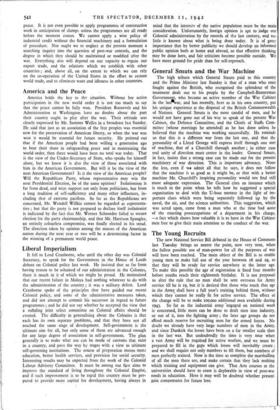America and the Peace
America holds the key to the situation. Without her active participation in the new world order it is not too much to say that the peace cannot be fully won. President Roosevelt and his Administration at Washington have no doubts about the part their country ought to play after the war. Their attitude was clearly expressed by Mr. Sumner Welles in a broadcast last Sunday. He. said that just as an association of the free peoples was essential now for the preservation of American liberty, so when the war was won it would be essential for future security. He pointed out that if the American people had been willing a generation ago to bear their share in safeguarding peace and in maintaining the world order, then there would have been no total war today. That is the view of the Under-Secretary of State, who speaks for himself alone, but we know it is also the view of those associated with him in the American Government. But will it be the view of the next American Government? Is it the view of the American people? Will the Republican Party, whose representative may win the next Presidential Election, be of the same opinion? Isolationism is far from dead, and wins support not only from politicians, but from a long tradition of self-sufficiency and many other influences, in- cluding that of extreme pacifism. So far as the Republicans are concerned, Mr. Wendell WiLlitie cannot be regarded as representa- tive; but that the party is not prepared to declare itself isolationist is indicated by the fact that Mr. Werner Schroeder failed to secure election for the party chairmanship, and that Mr. Harrison Spangler, an entirely colourless compromise, was finally elected in his stead. The direction taken by opinion among the masses of the American nation during the next year or two will be a determining factor in the winning of a permanent world peace.


























 Previous page
Previous page